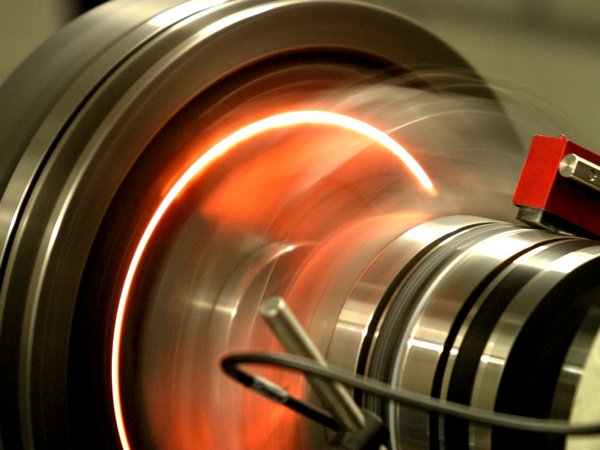Tribology Systems
Tribological systems make an essential contribution to fulfilling functions of modern technical systems. Designing and optimizing tribological systems has always been a challenge due to complex interactions in friction contact. Our research is therefore geared towards methods for numerical and experimental modeling of tribological systems and their validation taking multi-physical and multi-scale factors into account. We develop suitable validation methods and friction models with emphasis on clutches, brakes as well as plain and roller bearings and from this derive optimized tribological systems.
Research Focus:
- FEM Simulation-model of friction and wear in dry and wet tribological systems
- Development of thin-film sensors for under mixed-friction condition
- Reducing friction and wear of tribological systems by means of modified cutting tools
Systems
Development- & validation enviroment
- Machine elements
- Journal- and roller bearings
- Drive Systems
- gearboxes
- bearings
- Hydraulic
- Pumps
- Systems tribology
- Disc-on-disc contact
- Cylincer - piston contact
- Multi-axle transient load collectives
Methods
Development- & validation enviroment for:
- Experimental and simulative validiation of tribological systems
- Friction- and Wearreduction in sliding- and rolling contacts
- Advanced Materials, in particular polymers
Simulationmodelling:
- FEM-mixed friction model (dry und wet)
Contactmodelling:
- Modelling of tribological contacts
- Interaction in tribological systems
Condition Monitoring und measurement methods:
- Journal- und rollerbearing monitoring
- Thin-layer sensors
- Acoustic Emission technique
- Parameter-based data analysis strageties for measurment data
Processes
- Development- & validationprocess
- Screeningprocess for materials for tribological application
Equipment
- Test Benches for rolling and sliding contacts for experimental investigations of roller and journal bearings
- System tribometers for various stress- and loadcollectives
- Testbenches for tribological investestigations on drive systems
- Measurement systems für geometry and topography to determine important tribological properties
- Data aquistion systems for tribological measurement values
- Condition Monitoring
- Acoustic Emissions and Data Analysis
- Simulation models for tribological systems
- FEM model for mixed friction
- Data acquision system for mobile applications
For a list of the insitute’s equipment please click here.
Publications within the Research Field
2020
A numerical approach for the determination of Archard’s wear coefficient
Joerger, A.; Albers, A.
2020. Tribology - industrial and automotive lubrication : 22nd International Colloquium Tribology, Stuttgart/Ostfildern, 28-30 January 2020. Ed.: Arshia Fatemi, 277–278
Joerger, A.; Albers, A.
2020. Tribology - industrial and automotive lubrication : 22nd International Colloquium Tribology, Stuttgart/Ostfildern, 28-30 January 2020. Ed.: Arshia Fatemi, 277–278
2017
Prediction of the product quality of turned parts by real-time acoustic emission indicators
Albers, A.; Stürmlinger, T.; Wantzen, K.; Gladysz, B.; Münke, F.
2017. Procedia CIRP, 63, 348–353. doi:10.1016/j.procir.2017.03.173
Albers, A.; Stürmlinger, T.; Wantzen, K.; Gladysz, B.; Münke, F.
2017. Procedia CIRP, 63, 348–353. doi:10.1016/j.procir.2017.03.173
On the influence of surface roughness on the wear behavior in the running-in phase in mixed-lubricated contacts with the finite element method
Albers, A.; Reichert, S.
2017. Wear, 376-377 (Part B), 1185–1193. doi:10.1016/j.wear.2017.01.035
Albers, A.; Reichert, S.
2017. Wear, 376-377 (Part B), 1185–1193. doi:10.1016/j.wear.2017.01.035
2016
A New Tribological Test Bench for Lightweight Hydraulic Axial Piston Pumps
Albers, A.; Blust, M.; Wantzen, K.; Lorentz, B.
2016. Proceedings of the 20th International Colloquium Tribology : Industrial and Automotive Lubrication, Stuttgart / Ostfildern, Germany, 12th - 14th January 2016. Ed.: A. Fatemi, Technische Akademie Esslingen (TAE)
Albers, A.; Blust, M.; Wantzen, K.; Lorentz, B.
2016. Proceedings of the 20th International Colloquium Tribology : Industrial and Automotive Lubrication, Stuttgart / Ostfildern, Germany, 12th - 14th January 2016. Ed.: A. Fatemi, Technische Akademie Esslingen (TAE)
2012
Energy-efficient hydrodynamic journal bearings by means of condition monitoring and lubrication flow control
Albers, A.; Nguyen, H. T.; Burger, W.
2012. International Journal of Condition Monitoring, 2 (1), 18–21. doi:10.1784/204764212800028860
Albers, A.; Nguyen, H. T.; Burger, W.
2012. International Journal of Condition Monitoring, 2 (1), 18–21. doi:10.1784/204764212800028860
2008
Investigations on highly and complex loaded friction contacts under mixed conditions based on a novel model bench
Albers, A.; Behrendt, M.; Ott, S.
2008. Lubricants, materials and lubrication engineering - 16th International Colloquium Tribology. Ed.: W. J. Bartz, Technische Akademie Esslingen (TAE)
Albers, A.; Behrendt, M.; Ott, S.
2008. Lubricants, materials and lubrication engineering - 16th International Colloquium Tribology. Ed.: W. J. Bartz, Technische Akademie Esslingen (TAE)

